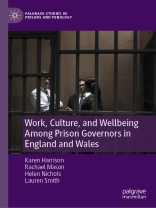This book offers a focused and detailed insight into the health and wellbeing of prison staff, specifically focussing on prison leaders and managers. The authors bring together expertise from psychology, health, law, and criminology, to
present a unique multidisciplinary examination of health and wellbeing based on interviews with Prison Governors’ Association members. Examining how the participants described their health and wellbeing at work and at home, the
authors reveal dysfunctional culture, disenchantment and disengagement, the heavy weight of expectations and high levels of professional uncertainty relating to the future. It argues that more governor grade specific and arguably mandated support is needed. Recommendations from the book will contribute to improving health and wellbeing amongst the governor work force, feeding into positive outcomes in relation to staff retention and prison expansion challenges.
สารบัญ
1. Not an Ordinary Place of Work: The prison working environment and the basis of our study;
2. Current understandings of health, wellbeing and the impacts of the prison working environment;
3. The health and wellbeing of prison governors: Exploring the Power Threat Meaning Framework;
4. The impact of workplace culture on prison governor wellbeing.
5. Is there anybody out there? The role of relationships in prison governor wellbeing;
6. Fears and challenges of working through a pandemic;
7. From workplace disenchantment to re-enchantment;
8. Humanisation of Workplace Wellbeing: A new conceptual model
เกี่ยวกับผู้แต่ง
Karen Harrison is Professor of Law and Penal Justice in Lincoln Law School at the University of Lincoln, UK.
Rachael Mason is Senior Lecturer in Health and Social Care in the School of Health and Social Care at the University of Lincoln, UK.
Helen Nichols is Senior Lecturer in Criminology in the School of Criminology, Sociology and Policing at the University of Hull, UK.
Lauren Smith is Senior Lecturer in Psychology in the School of Psychology at the University of Lincoln, UK.












